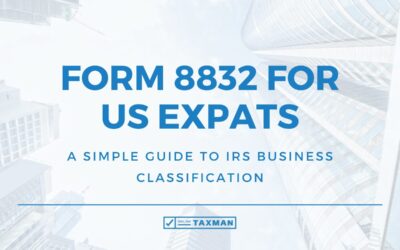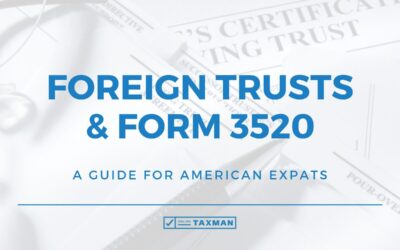US Taxes for Americans Living in Thailand – A 10 Step Guide for Expats

Whether you’re an American thinking of moving to Thailand, or perhaps you’re already enjoying life in Bangkok or Chiang Mai, don’t forget your US tax obligations.
The US taxes based on citizenship, not residency, means that all Americans living abroad must file a US tax return annually, reporting their worldwide income. You may also have to report your non-US businesses and financial accounts and assets.
The good news is that there are provisions you can claim to reduce your US tax bill and avoid double taxation. In fact, with strategic planning, living overseas can be more tax-efficient than living in the US.
In this article, we provide an overview of what US expats in Thailand need to know. Whether you’re a retiree, remote working digital nomad, or expat business owner, learn how to avoid double taxation, stay compliant, and take advantage of IRS tax benefits.
- 1. US Citizens in Thailand still have to file a US tax return
- 2. US tax deadlines and extensions for Americans in Thailand
- 3. A summary of Thai Taxes for US expats
- 4. Tax incentives in Thailand for US expats
- 5. Avoiding double taxation
- 6. Social Security taxes for Americans in Thailand
- 7. Reporting Thai bank accounts: FBAR and FATCA
- 8. Other US reporting requirements to be aware of
- 9. State taxes for Americans living abroad
- 10. Didn’t know you had to file US taxes? Seek advice
1. US Citizens in Thailand still have to file a US tax return
Even if you live full-time in Thailand, you must file a US federal income tax return if your income exceeds the standard thresholds. For tax year 2024, the thresholds are:
● $14,600 for single filers under age 65
● $29,200 for married couples filing jointly
However, thresholds can be lower in certain situations. For example:
● Just $400 of self-employment income requires you to file
● Only $5 of total income triggers filing if you’re married to a non-US citizen and filing separately
As a US citizen or Green Card holder, even if you pay Thai income tax, you must report your worldwide income to the IRS each year. We’ll explain how to avoid double taxation later on.
2. US tax deadlines and extensions for Americans in Thailand
Expats living abroad automatically receive a two-month extension to file their federal return—pushing the deadline from April 15 to June 15. However, any taxes owed must still be paid by April 15 to avoid interest.
If you still need more time, you can request an additional extension to October 15 by filing Form 4868.
3. A summary of Thai Taxes for US expats
If you reside in Thailand for more than 180 days in a calendar year, you’re considered a Thai tax resident. As a resident, you’re generally taxed on income earned in Thailand, and possibly on foreign-sourced income if it’s brought into Thailand in the same tax year.
Thai income tax rates start at 5% for low earners, and rise to 35% for income over THB 5 million (approx. $140,000 USD)
The Thai tax year is the calendar year, and personal income tax returns are typically due by March 31 of the following year.
4. Tax incentives in Thailand for US expats
Thailand has recently introduced several tax-friendly initiatives to attract skilled professionals, retirees, and wealthy investors, including the Long-Term Resident (LTR) Visa. This program allows qualifying Thai residents to not pay Thai income tax on income sourced outside the country. There are several categories, including:
1. LTR visa for foreign retirees
US citizens aged 50+ who receive at least $80,000 per year of passive income (such as pension, dividend, or rental income), or $40,000 per year and make a $250,000 investment in Thai government bonds, can apply for the LTR visa. It offers a 10-year residency, fast-track work permits, and a possible personal income tax rate of 17% (instead of up to 35%) for qualifying professionals.
2. LTR visa for remote workers & skilled professionals
Digital nomads and remote employees of foreign companies may also qualify for LTR status, provided they meet income thresholds and professional experience criteria. This makes Thailand increasingly attractive to Americans working remotely. Note that Thailand also has a shorter term Digital Nomad Visa.
3. Tax incentives for investors & wealthy individuals
High net-worth individuals investing at least $500,000 in Thai assets (real estate, bonds, or businesses) may qualify for long-term residency and certain tax privileges.
Combined with US tax benefits for expats such as the Foreign Earned Income Exclusion, some Americans may be able to live in Thailand tax free, if they get their planning right.
5. Avoiding double taxation
While Thailand and the US have signed a tax treaty, US citizens still have to file and claim IRS provisions to avoid double taxation:
The Foreign Earned Income Exclusion (FEIE)
The FEIE allows you to exclude up to $126,500 (for tax year 2024, $130,000 in 2025) of earned income from US taxes. You can qualify by either:
● Spending 330 full days outside the US in a 12-month period (this is the Physical Presence Test), or
● Establishing bona fide residence in Thailand (this is the Bona Fide Residence Test)
You can claim the FEIE by filing Form 2555.
The Foreign Tax Credit (FTC)
If you pay Thai income taxes, the FTC gives a dollar-for-dollar credit against your US tax bill. Unlike FEIE, the FTC applies to a broader range of income, including passive income such as dividends or rental income.
Claim the FTC using Form 1116. You can use both FEIE and FTC in the same year, but not on the same income.
6. Social Security taxes for Americans in Thailand
Thailand also has social security contributions if you’re employed locally or self-employed.
As there is no totalization agreement between the US and Thailand, you may have to pay social security taxes to both countries in certain circumstances (e.g., if you’re self-employed) if you’re a Thai tax resident, unless you plan carefully.
7. Reporting Thai bank accounts: FBAR and FATCA
US expats with foreign bank accounts must report them if their total value exceeds $10,000 at any point in the year.
● File the FBAR (FinCEN Form 114) separately from your tax return.
● FATCA Form 8938 may also apply if your foreign assets exceed $200,000 (single) or $400,000 (married filing jointly) while living abroad.
These forms are typically applicable if you have:
● Thai bank and brokerage accounts
● Foreign pensions and mutual funds
● Business interests in Thailand
8. Other US reporting requirements to be aware of
If you have a business registered in Thailand, you will have to report it to the IRS on Form 5471.
You should also exercise extreme caution when investing in Thai mutual funds or other pooled investments, which are subject to punitive US tax treatment and complex reporting (Form 8621).
Thailand has few tax-deferred retirement savings options, and most are not recognized as qualified plans under US tax law. This means that contributions to Thai retirement funds may be taxable in the US even if deferred locally, as well as distributions. Some Thai investment or retirement accounts may also be considered foreign trusts. If so, you’ll have to file Form 3520 or 3520-A.
Tip: Consider keeping US-based retirement savings in US accounts such as IRAs or 401(k)s. While they are not tax-deferred under Thai law, they simplify your US taxes, and you may qualify for tax relief in Thailand under certain visa programs.
9. State taxes for Americans living abroad
Some US states (notably California, New York, and New Mexico) make it hard to sever state tax residency.
So you may still owe state income taxes if you
● Maintain a home
● Hold a driver’s license or financial accounts in the state
● Vote or have dependents in the state
So, some states may require you to cut all ties with the state and establish clear residence in Thailand. Some expats plan to move to a no-tax state before moving abroad to avoid these issues.
10. Didn’t know you had to file US taxes? Seek advice
If you’ve been living in Thailand and didn’t know you had to file US taxes, the IRS Streamlined Filing Procedures may let you catch up penalty-free.
Life in Thailand is a fascinating experience, but managing the US and Thai tax systems together can be tricky. With the right planning and professional guidance, though, it’s possible to both remain compliant and minimize your tax bill.
At Online Taxman, we specialize in US expat taxes and understand the unique needs of Americans living in Thailand. We can help you:
● File all necessary IRS forms (including FBAR, FATCA, foreign businesses, and PFICs)
● Avoid double taxation
● Optimize your tax position for expat life, retirement, or remote working abroad
Get in touch with us today to simplify your tax obligations while enjoying life in the Land of Smiles.
Ready to seek assistance with your US taxes?

Vincenzo Villamena, CPA
Stay Informed With The Online Taxman Newsletter
Your Title Goes Here
Text goes here






